Door Service Front
Removal Procedure-Body
- Remove the door from the body.
- Remove any excess sealer surrounding the existing hinge and scribe the location of the hinge on the hinge pillar.
- Lightly hand-sand the existing hinge with 100 grit or finer sandpaper in order to locate the 4 welds that attach the hinge to the pillar.
- Center punch each of the 4 weld marks on the original hinge.
- Drill through the hinge only (2), at each punch location. Use a 13 mm (½ in) rotabroach hole saw (3) or the equivalent.
- Remove the hinge. If necessary, use a chisel in order to separate the hinge from the pillar.
- Remove all of the remaining weld from the pillar surface in order to ensure a flush fit of the service hinge.
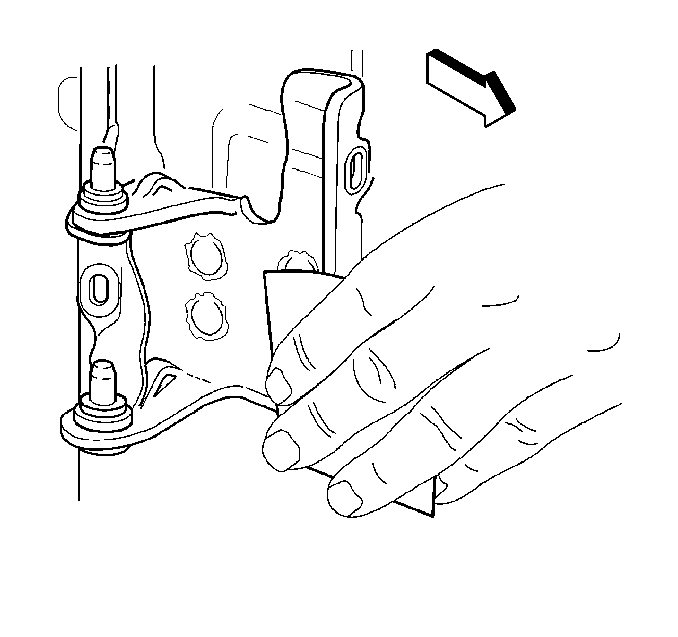
Important: Punch the center of the weld so that as much of the weld as possible is removed during the drilling.
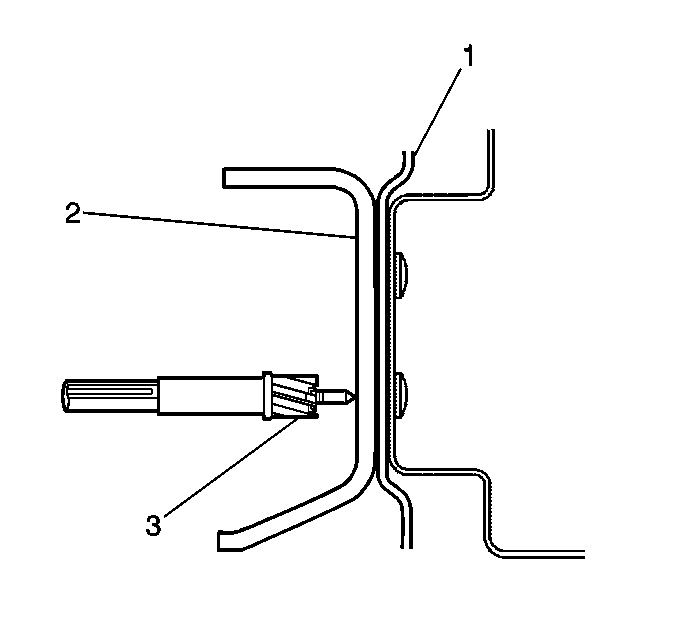
Important: Do not drill into the hinge pillar (1).
Installation Procedure
- Repair any damage done to the pillar during the drilling or the removal.
- Position the service hinge within the scribe marks on the pillar.
- Center punch each stud location on the hinge pillar according to the service hinge.
- Drill a 3 mm (1/8 in) pilot hole at each center punch location.
- Drill an 11.5 mm (29/64 in) hole at the pilot locations for the studs (1).
- Clean and prepare all of the bare metal surfaces.
- Apply approved anti-corrosion primer.
- Feed fish wire (1), GM P/N 15017229 or the equivalent, through the hinge, the hinge stud hole and out of the conduit hole in the pillar.
- Install the stud (2), GM P/N 15017230, supplied with the service hinge into the wire end. Pull the stud into position.
- Hold the stud in position with the hinge and remove the fish wire.
- Draw the stud tight through the pillar. Use the nuts (1) (GM P/N 11516746) supplied.
- Repeat steps 7-10 on the remaining stud locations.
- Remove each service nut.
- Apply a full-bodied caulk to the entire hinge mounting surface in order to ensure a proper seal.
- Install the hinge (2) to the pillar (3). Use the supplied nuts.
- Clean and prepare all of the surfaces as necessary for refinishing.
- Apply the sealers.
- Refinish the surfaces as necessary.
- Install and align all of the related panels and the components.
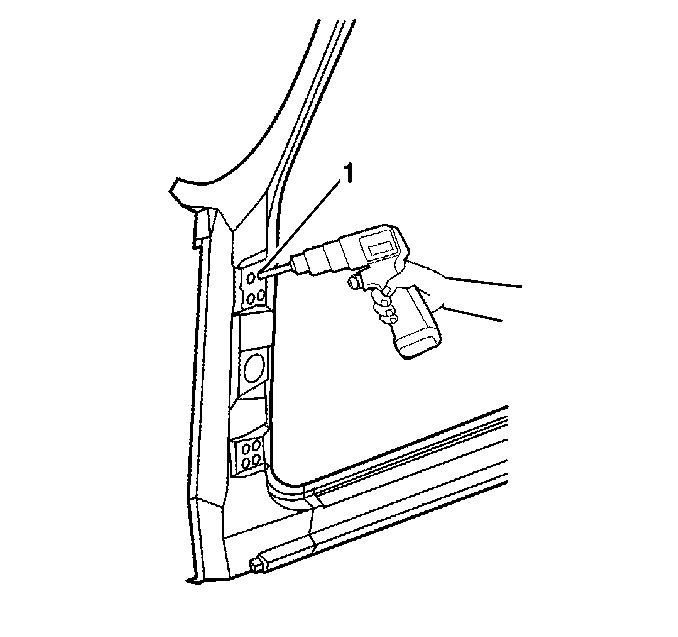
Important: Drill must be exact size.
Important: Prior to refinishing, refer to GM 4901MD-99 Refinish Manual for recommended products. Do not combine paint systems. Refer to paint manufacturer's recommendations.
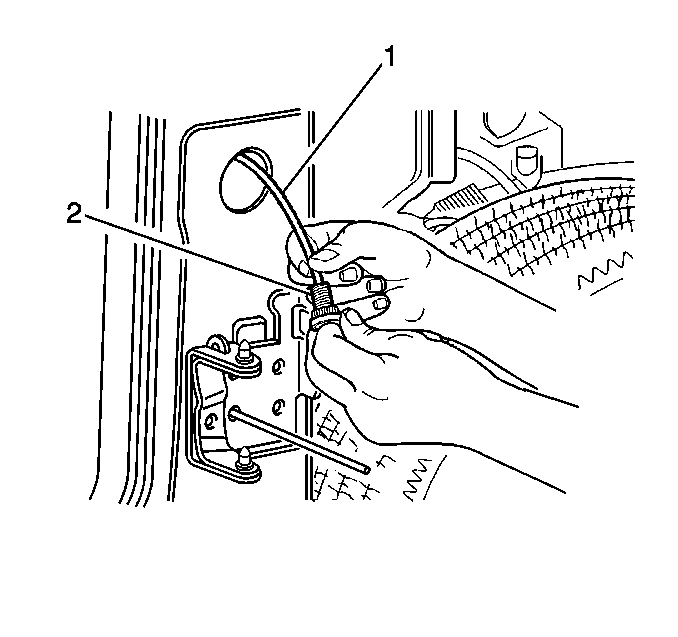
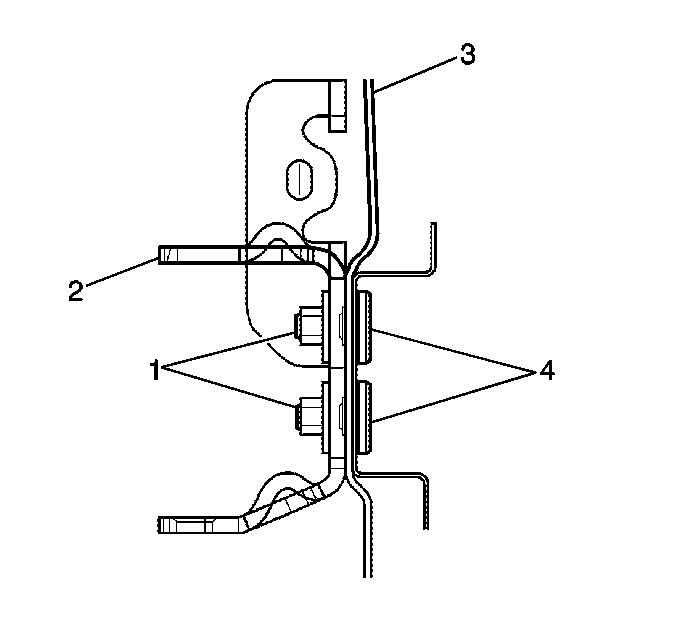
Notice: Use the correct fastener in the correct location. Replacement fasteners must be the correct part number for that application. Fasteners requiring replacement or fasteners requiring the use of thread locking compound or sealant are identified in the service procedure. Do not use paints, lubricants, or corrosion inhibitors on fasteners or fastener joint surfaces unless specified. These coatings affect fastener torque and joint clamping force and may damage the fastener. Use the correct tightening sequence and specifications when installing fasteners in order to avoid damage to parts and systems.
Tighten
Torque the hinge to the pillar nuts to 25 N·m (18 ft lb).
Removal Procedure-Door
- Remove the door from the body.
- Remove any excess sealer surrounding the hinge and scribe the location of the hinge on the door.
- Lightly hand-sand the existing body hinge with 100 grit or finer sandpaper in order to locate the 4 welds that attach the hinge to the door.
- Center punch each of the 4 weld marks on the original hinge base.
- Drill through hinge base only (2) at the punch location. Use a 13 mm (½ in) rotabroach hole saw (3) or the equivalent.
- Remove hinge. If necessary, use a chisel to separate the hinge from the door.
- Remove all of the remaining weld from the door surface in order to ensure a flush fit of the service hinge.
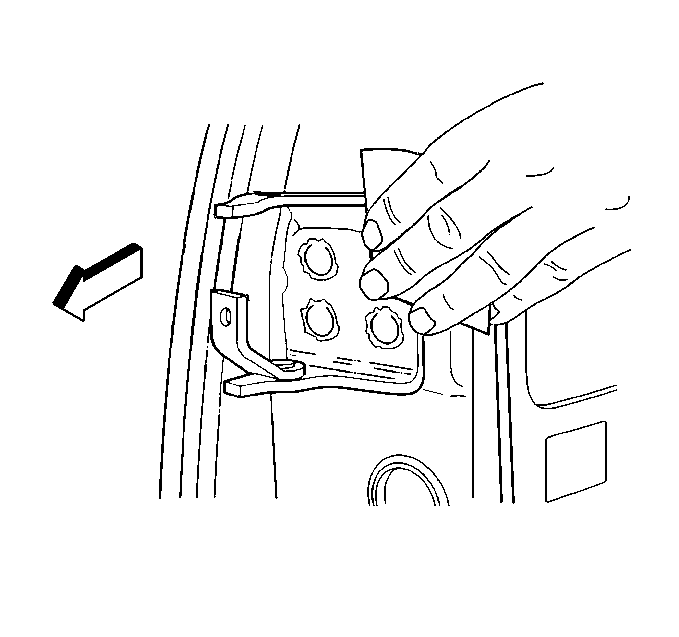
Important: Punch the center of the weld so that as much of the weld is removed during the drilling as possible.
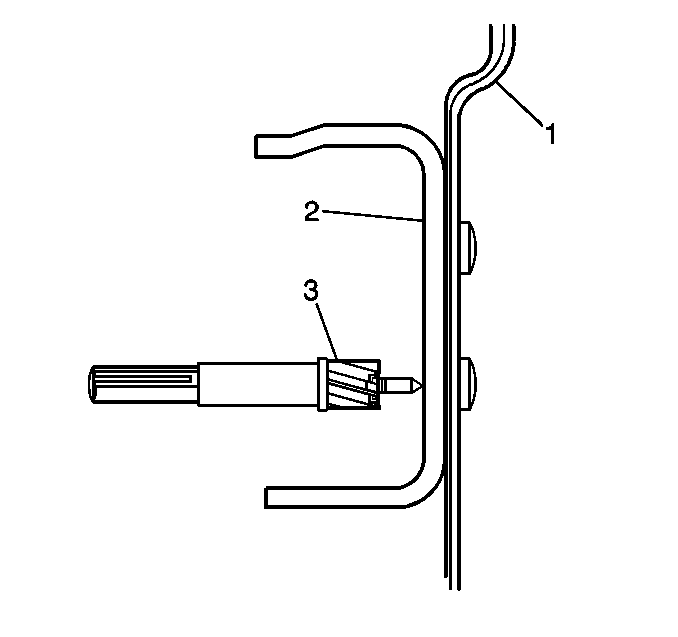
Important: Do not drill into the door (1).
Installation Procedure
- Repair any damage done to door during the drilling or the removal.
- Clean and prepare the backing plate mounting surfaces in order to ensure a flush fit of the backing plate.
- Position the service hinge within the scribe marks on the door.
- Center punch each hole location on the door according to the service hinge.
- Drill a 3 mm (1/8 in) pilot hole at each center punch location.
- Drill a 13 mm (1/2 in) hole at the pilot locations.
- Clean and prepare all of the bare metal surfaces.
- Apply approved anti-corrosion primer.
- Apply full-bodied caulk to the entire hinge mounting surface in order to ensure a proper seal.
- Align the hinge (1) and the backing plate (4) with the holes in the door (2).
- Install the bolts (3).
- Apply the sealers.
- Refinish the metal surfaces as necessary.
- Install and align all of the related panels and the components.
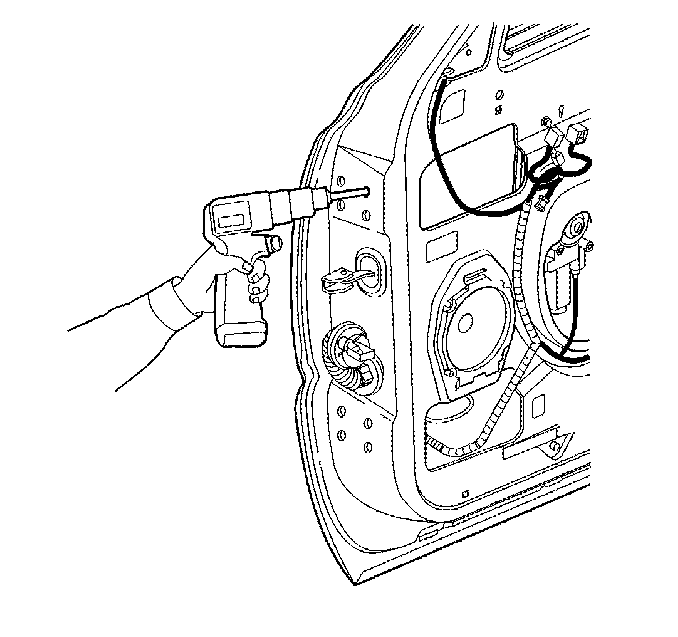
Important: Prior to refinishing, refer to GM 4901MD-98 Refinish Manual for recommended products. Do not combine paint systems. Refer to paint manufacturer's recommendations.
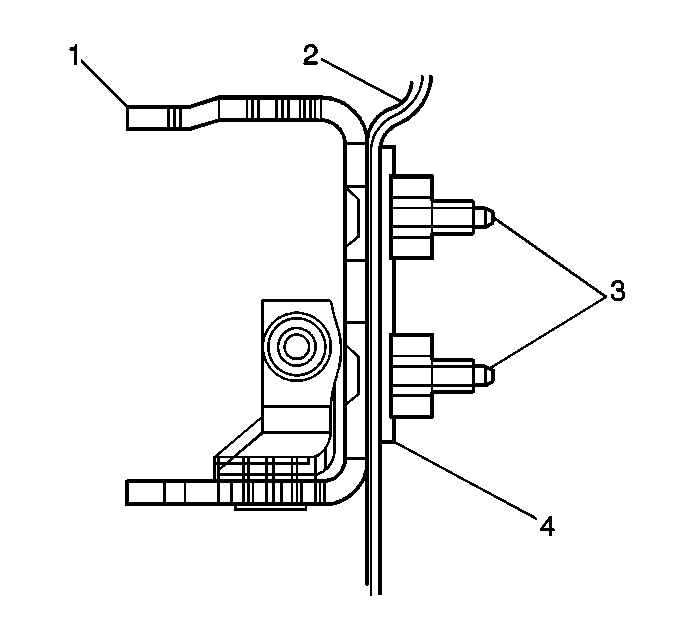
Notice: Use the correct fastener in the correct location. Replacement fasteners must be the correct part number for that application. Fasteners requiring replacement or fasteners requiring the use of thread locking compound or sealant are identified in the service procedure. Do not use paints, lubricants, or corrosion inhibitors on fasteners or fastener joint surfaces unless specified. These coatings affect fastener torque and joint clamping force and may damage the fastener. Use the correct tightening sequence and specifications when installing fasteners in order to avoid damage to parts and systems.
Tighten
Tighten the bolts to 25 N·m (18 ft lb).
Door Service Door Side Hinge Replacement-Front
Removal Procedure
- Remove the door from the body.
- Remove any excess sealer surrounding the hinge and scribe the location of the hinge on the door.
- Lightly hand-sand the existing body hinge with 100 grit or finer sandpaper in order to locate the 4 welds that attach the hinge to the door.
- Center punch each of the 4 weld marks on the original hinge base.
- Drill through hinge base only (2) at the punch location. Use a 13 mm (½ in) rotabroach hole saw (3) or the equivalent.
- Remove hinge. If necessary, use a chisel to separate the hinge from the door.
- Remove all of the remaining weld from the door surface in order to ensure a flush fit of the service hinge.

Important: Punch the center of the weld so that as much of the weld is removed during the drilling as possible.

Important: Do not drill into the door (1).
Installation Procedure
- Repair any damage done to door during the drilling or the removal.
- Clean and prepare the backing plate mounting surfaces in order to ensure a flush fit of the backing plate.
- Position the service hinge within the scribe marks on the door.
- Center punch each hole location on the door according to the service hinge.
- Drill a 3 mm (1/8 in) pilot hole at each center punch location.
- Drill a 13 mm (1/2 in) hole at the pilot locations.
- Clean and prepare all of the bare metal surfaces.
- Apply approved anti-corrosion primer.
- Apply full-bodied caulk to the entire hinge mounting surface in order to ensure a proper seal.
- Align the hinge (1) and the backing plate (4) with the holes in the door (2).
- Install the bolts (3).
- Apply the sealers.
- Refinish the metal surfaces as necessary.
- Install and align all of the related panels and the components.

Important: Prior to refinishing, refer to GM 4901MD-98 Refinish Manual for recommended products. Do not combine paint systems. Refer to paint manufacturer's recommendations.

Notice: Use the correct fastener in the correct location. Replacement fasteners must be the correct part number for that application. Fasteners requiring replacement or fasteners requiring the use of thread locking compound or sealant are identified in the service procedure. Do not use paints, lubricants, or corrosion inhibitors on fasteners or fastener joint surfaces unless specified. These coatings affect fastener torque and joint clamping force and may damage the fastener. Use the correct tightening sequence and specifications when installing fasteners in order to avoid damage to parts and systems.
Tighten
Tighten the bolts to 25 N·m (18 ft lb).
Door Service Cargo Door, Body-Side Upper Hinge
Upper Removal Procedure
- Visually inspect and restore as much of the damage as possible to factroy specifications.
- Remove all of the related panels and the components.
- Remove any excess sealer surrounding the hinge.
- Scribe the location of the hinge on the hinge pillar.
- Locate and drill out all necessary factory welds in the hinge access panel.
- Pry access door out to gain access to the back side of the hinge.
- Locate and drill the center of the hinge welds using a 13 mm (1/2 in) drill bit or the equivalent.
- If necessary, use a chisel in order to separate the hinge from the pillar.
- Remove the hinge.
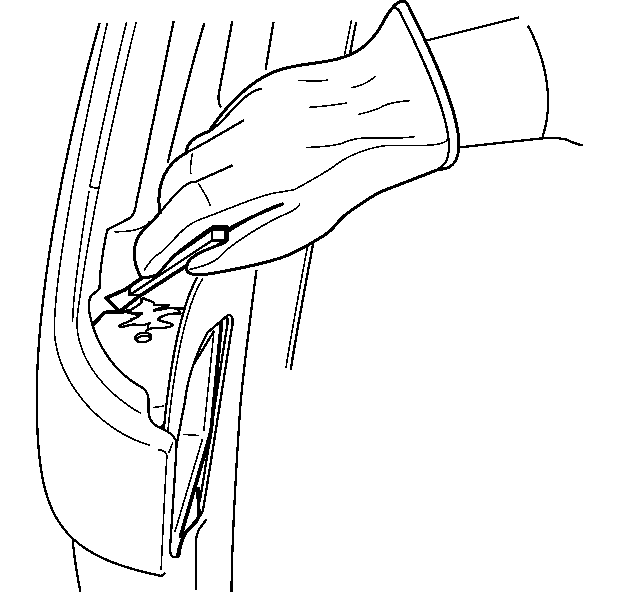
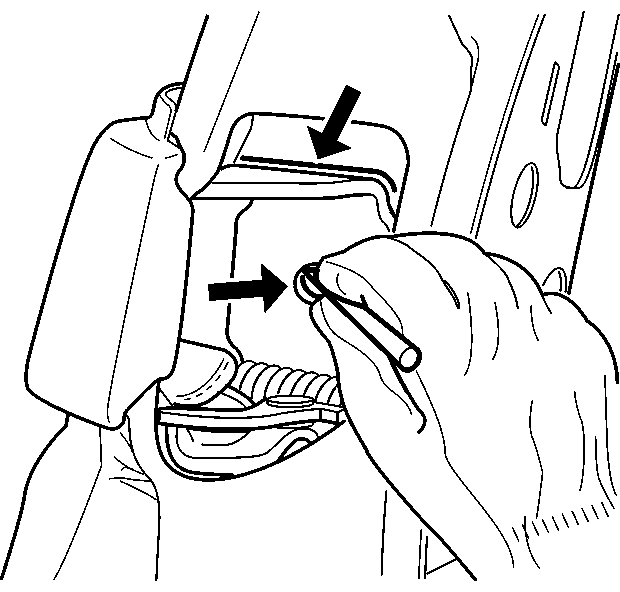
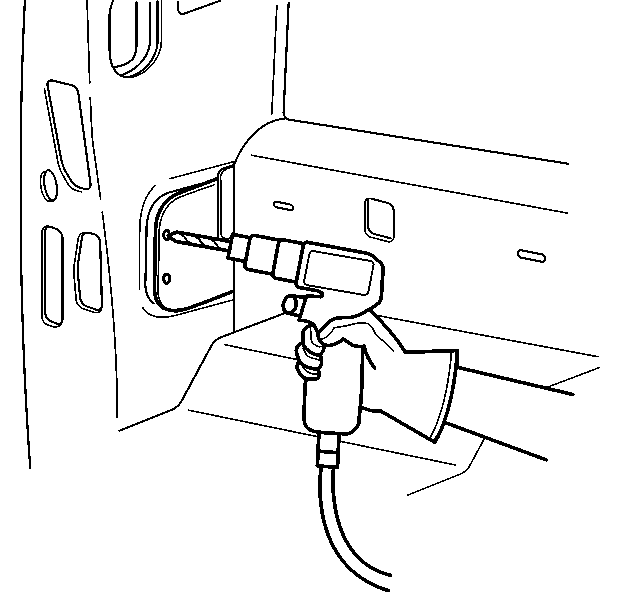
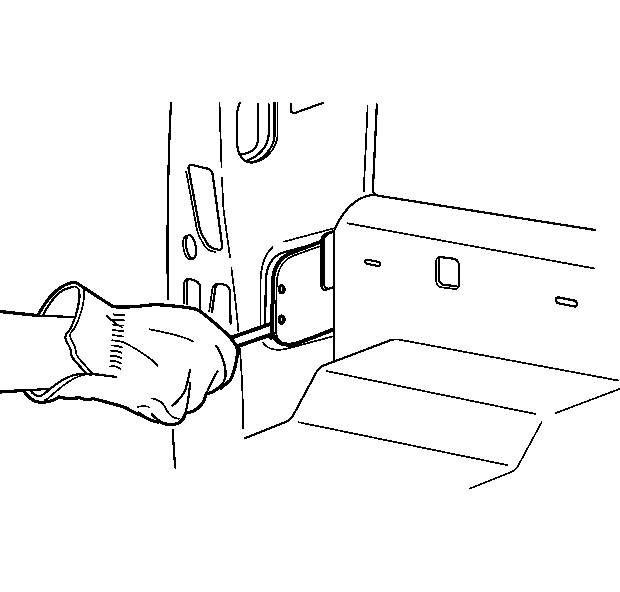
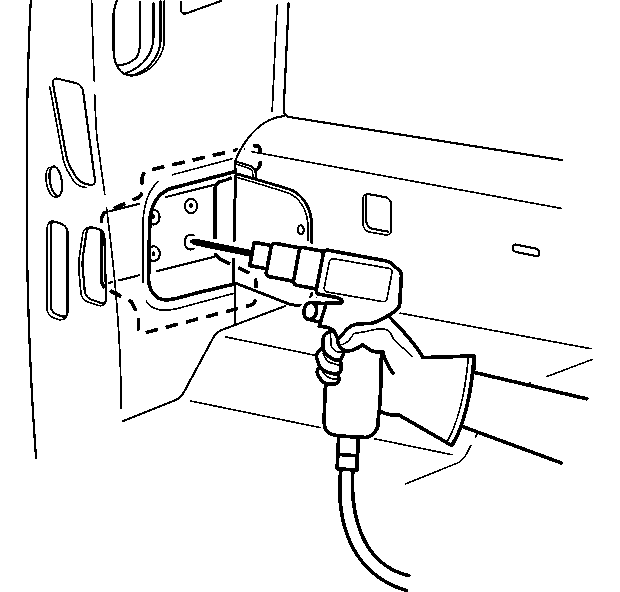
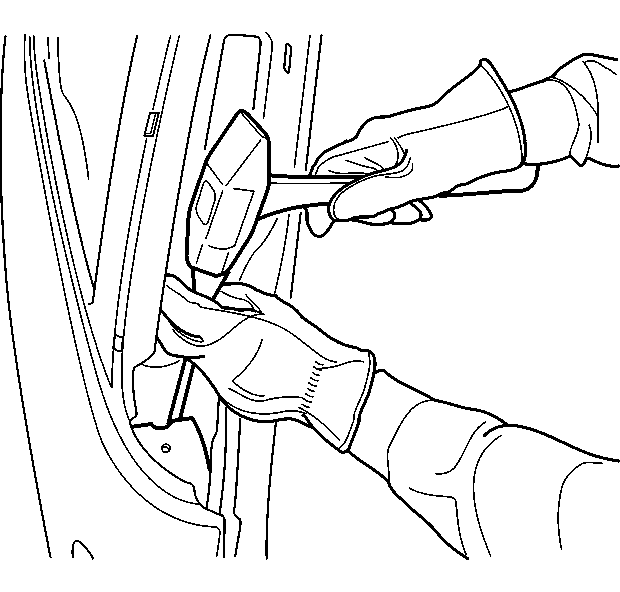
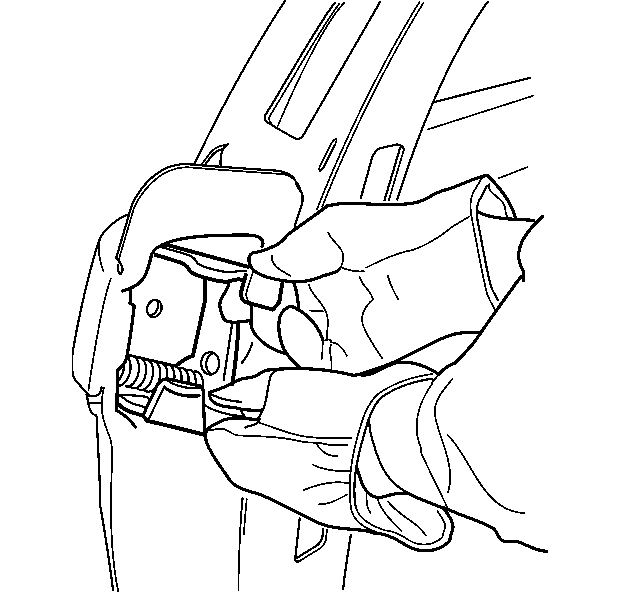
Installation Procedure
- Clean and prepare the pillar surfaces in order to ensure a flush fit of the service hinge and the fasteners.
- Apply an approved anti-corrosion primer.
- Apply full-body caulk to the entire hinge mounting surface.
- Position the service hinge within the scribe marks on the pillar.
- Install the hinge fasteners.
- Refinish the metal surfaces as necessary.
- Align and install all of the related panels and the components.
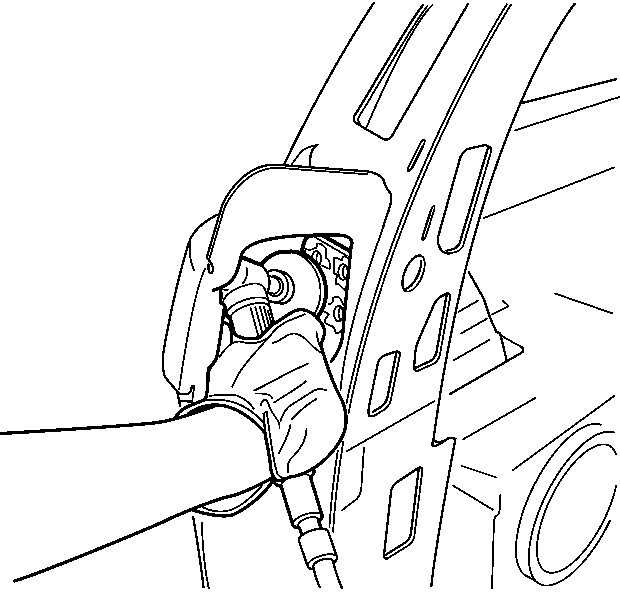
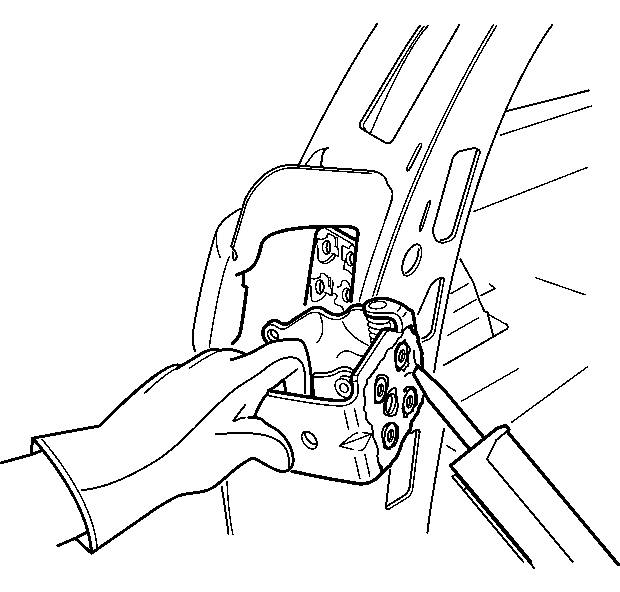
Important: Prior to refinishing, refer to GM 4901MD-99 Refinish Manual for recommended products. Do not combine paint systems. Refer to paint manufacturer's recommendations.
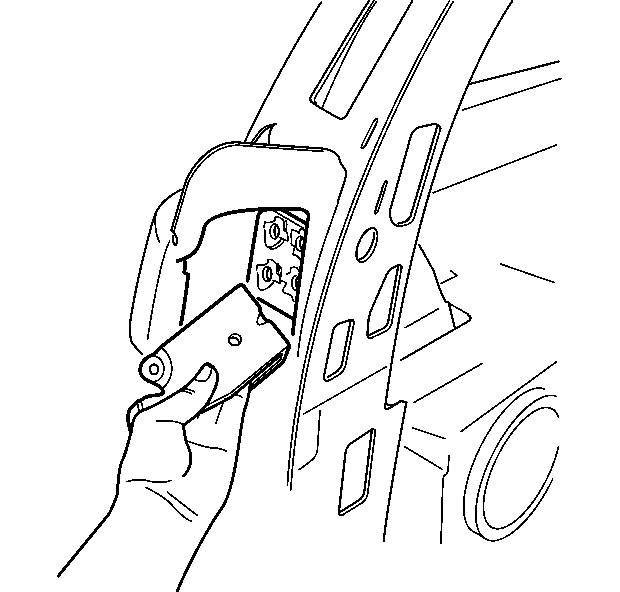
Notice: Use the correct fastener in the correct location. Replacement fasteners must be the correct part number for that application. Fasteners requiring replacement or fasteners requiring the use of thread locking compound or sealant are identified in the service procedure. Do not use paints, lubricants, or corrosion inhibitors on fasteners or fastener joint surfaces unless specified. These coatings affect fastener torque and joint clamping force and may damage the fastener. Use the correct tightening sequence and specifications when installing fasteners in order to avoid damage to parts and systems.
Tighten
Torque the bolts to 25 N·m (18 ft lb).
Lower Removal Procedure
- Remove any excess sealer surrounding the hinge.
- Remove all of the related panels and the components.
- Scribe the location of the hinge on the hinge pillar.
- Lightly hand-sand the existing hinge with 100 grit or finer sandpaper in order to locate the four welds that attach the hinge to the pillar.
- Center punch each of the four weld marks on the original hinge.
- Locate and drill out all necessary factory welds in the rear body opening lower filler, using 8 mm (5/16 in) spot weld remover, to gain access to the backside of the lower hinge.
- Carefully pry back the filler panel.
- Remove rear body opening lower filler. If necessary, use a chisel in order to separate the filler from the opening.
- Drill through the hinge only at each punch location. Use a 13 mm (1/2 in) rotabroach hole saw or the equivalent.
- If necessary, use a chisel in order to separate the hinge from the pillar.
- Remove the hinge.
- Remove all of the remaining weld from the pillar surface in order to ensure a flush fit of the service hinge.
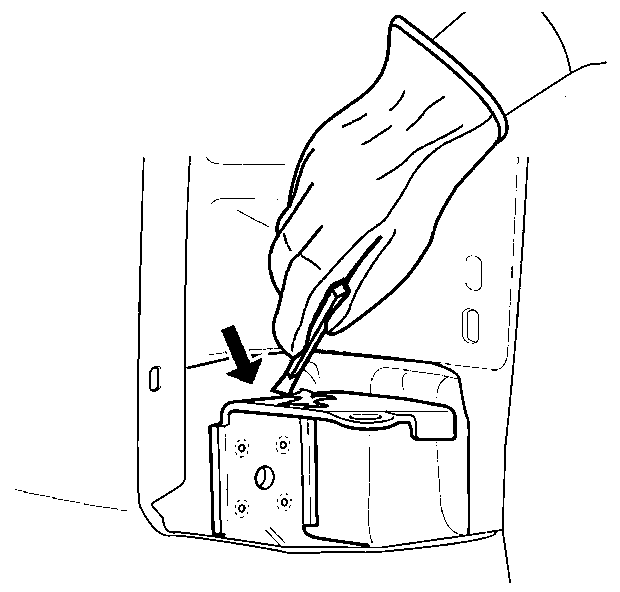
Visually inspect and restore as much of the damage as possible to factory specifications.
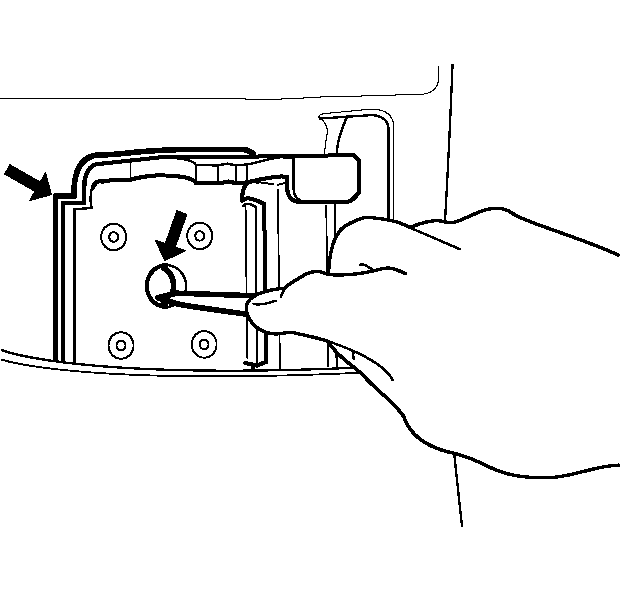
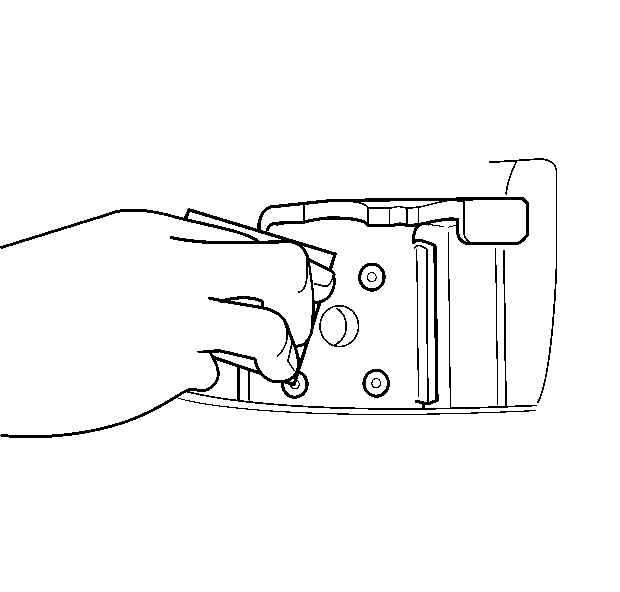
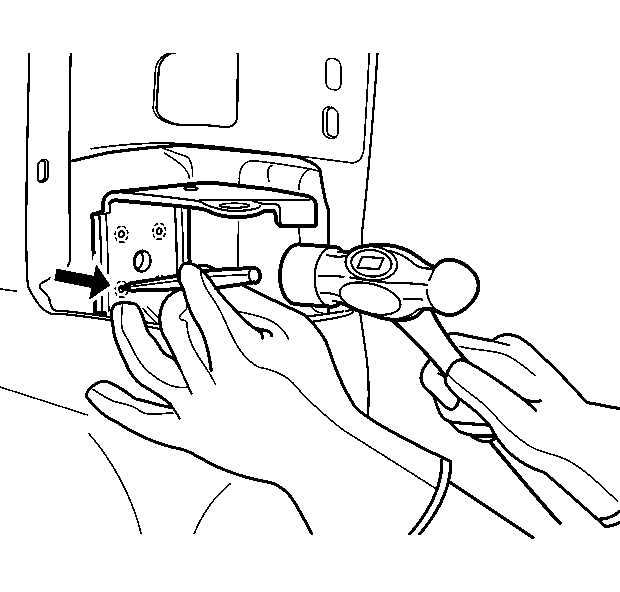
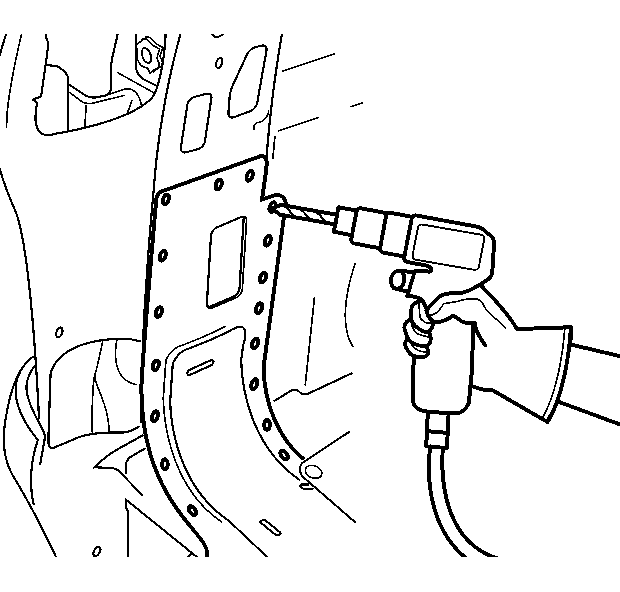
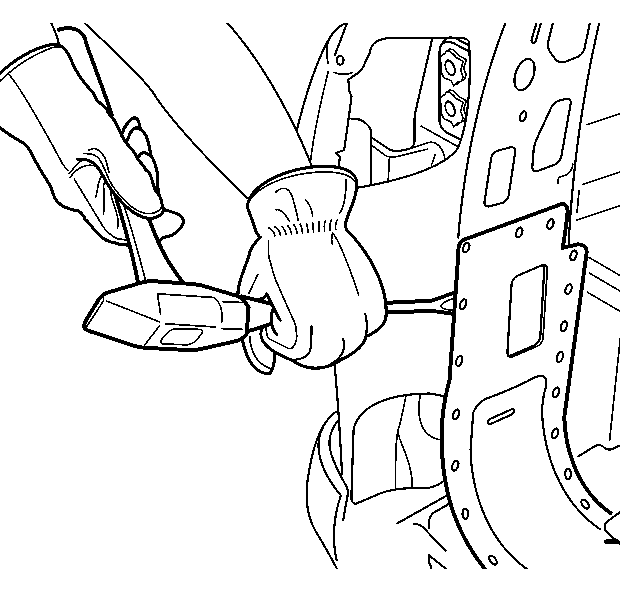
Important: Use care when removing the filler panel. The filler panel must be reinstalled.
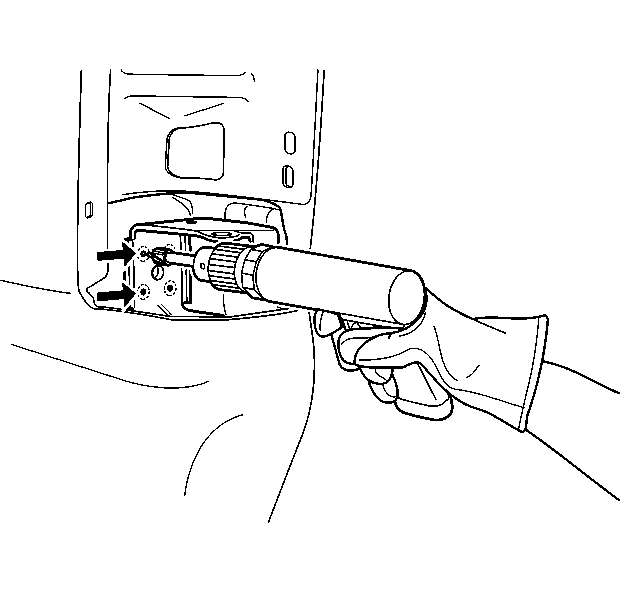
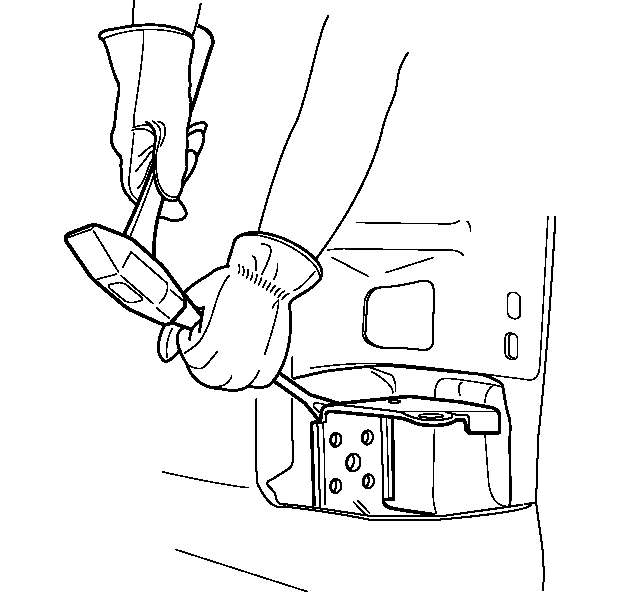
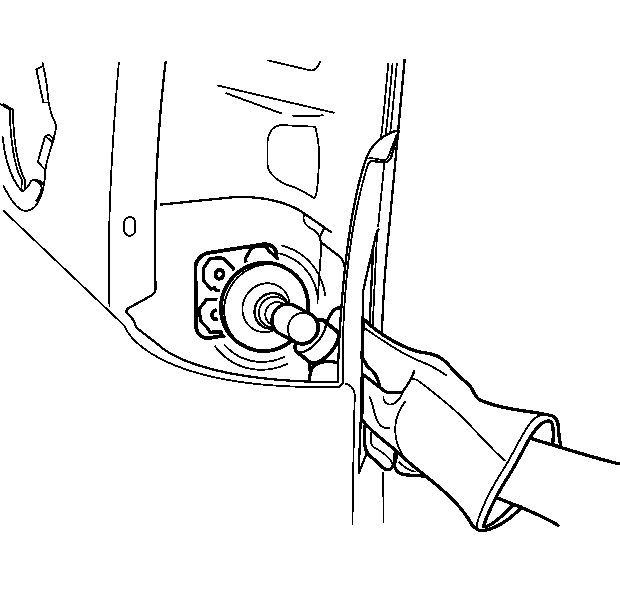
Installation Procedure
- Center punch each bolt location on the pillar according to the service hinge.
- Position the service hinge within the scribe marks on the pillar.
- Drill a 3 mm (1/8 in) pilot hole at each punch location.
- Drill a 13 mm (1/2 in) hole at the pilot locations.
- Clean and prepare all bare metal surfaces.
- Apply an approved anti-corrosion primer.
- Apply full-body caulk to the entire hinge mounting surface.
- Align the hinge with the holes in the pillar.
- Install the hinge fasteners.
- Position the rear body opening lower filler and mig weld in place at factory weld locations.
- Clean and prepare all weld surfaces.
- Refinish the metal surfaces as necessary.
- Align and install all of the related panels and the components.

Repair any damage done to the pillar during the drilling or the removal.
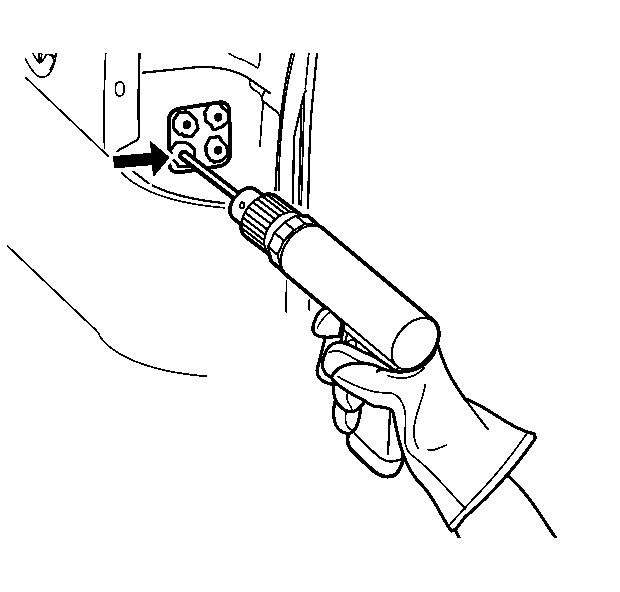
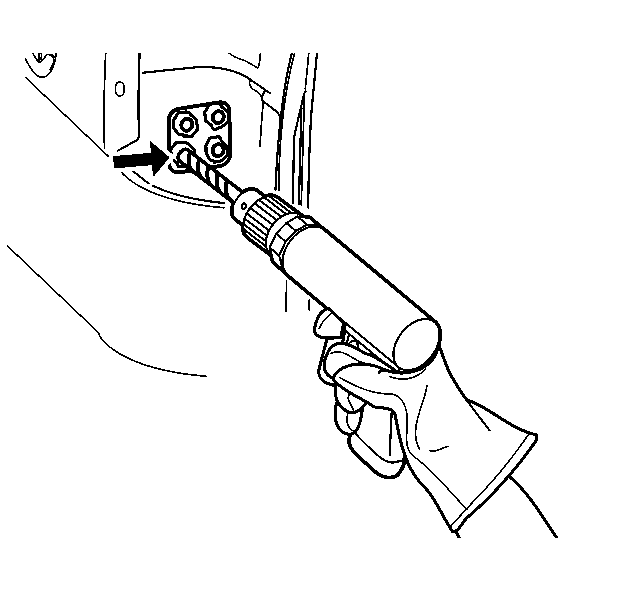
Important: Prior to refinishing, refer to GM 4901MD-99 Refinish Manual for recommended products. Do not combine paint systems. Refer to paint manufacturer's recommendations.
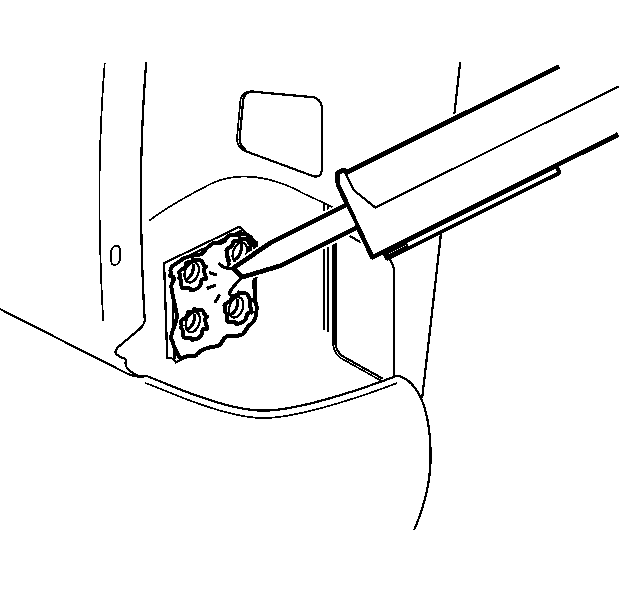
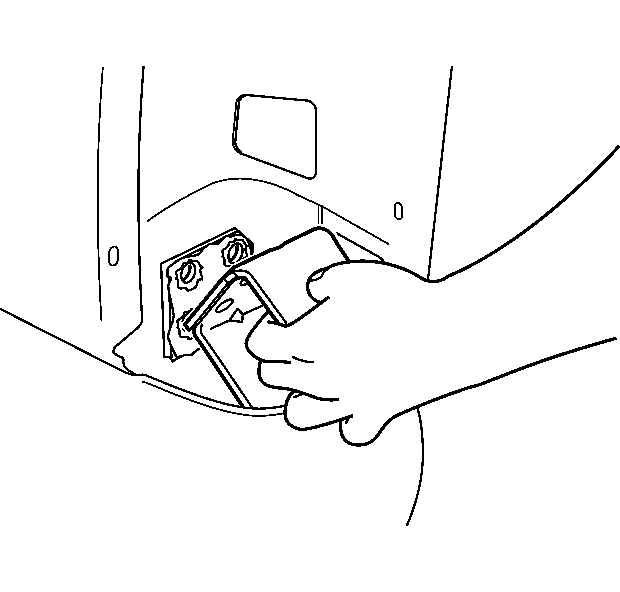
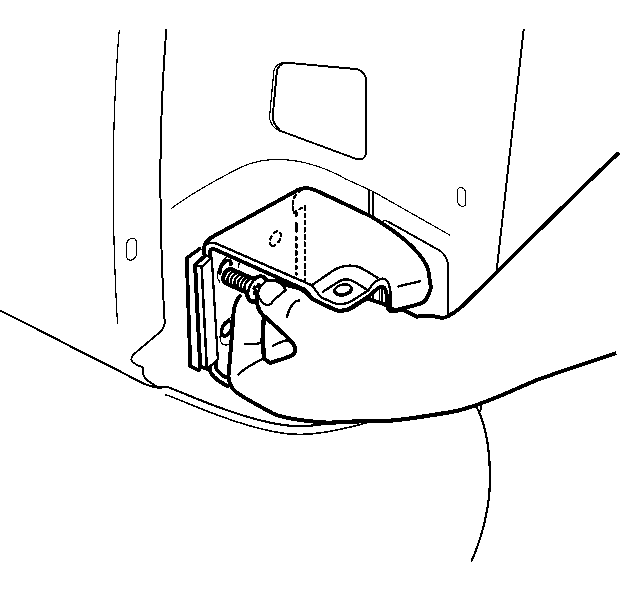
Notice: Use the correct fastener in the correct location. Replacement fasteners must be the correct part number for that application. Fasteners requiring replacement or fasteners requiring the use of thread locking compound or sealant are identified in the service procedure. Do not use paints, lubricants, or corrosion inhibitors on fasteners or fastener joint surfaces unless specified. These coatings affect fastener torque and joint clamping force and may damage the fastener. Use the correct tightening sequence and specifications when installing fasteners in order to avoid damage to parts and systems.
Tighten
Torque the bolts to 25 N·m (18 ft lb).
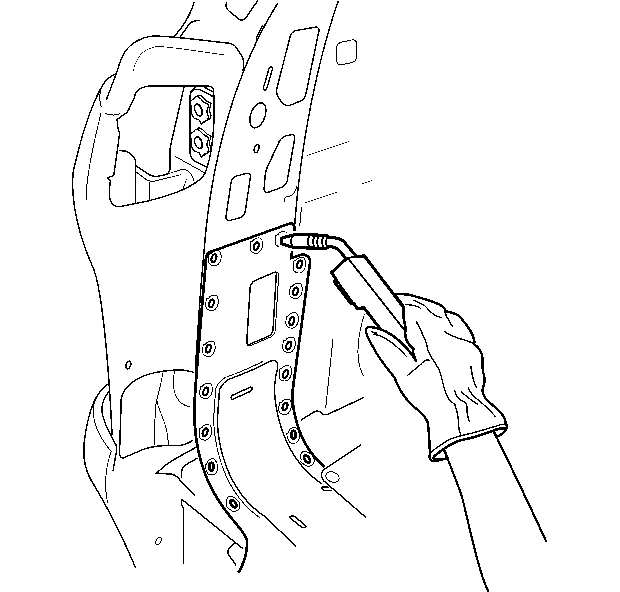
Door Service Cargo Door, Body-Side Lower Hinge
Removal Procedure
- Visually inspect and restore as much of the damage as possible to factory specifications.
- Remove all of the related panels and the components.
- Remove any excess sealer surrounding the hinge.
- Scribe the location of the hinge on the hinge pillar.
- Lightly hand-sand the existing hinge with 100 grit or finer sandpaper in order to locate the four welds that attach the hinge to the pillar.
- Center punch each of the four weld marks on the original hinge.
- Locate and drill out all necessary factory welds in the rear body opening lower filler, using 8 mm (5/16 in) spot weld remover, to gain access to the backside of the lower hinge.
- Carefully pry back the filler panel.
- Remove rear body opening lower filler. If necessary, use a chisel in order to separate the filler from the opening.
- Drill through the hinge only at each punch location. Use a 13 mm (1/2 in) rotabroach hole saw or the equivalent.
- If necessary, use a chisel in order to separate the hinge from the pillar.
- Remove the hinge.
- Remove all of the remaining weld from the pillar surface in order to ensure a flush fit of the service hinge.






Important: Use care when removing the filler panel. The filler panel must be reinstalled.



Installation Procedure
- Repair any damage done to the pillar during the drilling or the removal.
- Position the service hinge within the scribe marks on the pillar.
- Center punch each bolt location on the pillar according to the service hinge.
- Drill a 3 mm (1/8 in) pilot hole at each punch location.
- Drill a 13 mm (1/2 in) hole at the pilot locations.
- Clean and prepare all bare metal surfaces.
- Apply an approved anti-corrosion primer.
- Apply full-body caulk to the entire hinge mounting surface.
- Align the hinge with the holes in the pillar.
- Install the hinge fasteners.
- Position the rear body opening lower filler and mig weld in place at factory weld locations.
- Clean and prepare all weld surfaces.
- Refinish the metal surfaces as necessary.
- Align and install all of the related panels and the components.



Important: Prior to refinishing, refer to GM 4901MD-99 Refinish Manual for recommended products. Do not combine paint systems. Refer to paint manufacturer's recommendations.



Notice: Use the correct fastener in the correct location. Replacement fasteners must be the correct part number for that application. Fasteners requiring replacement or fasteners requiring the use of thread locking compound or sealant are identified in the service procedure. Do not use paints, lubricants, or corrosion inhibitors on fasteners or fastener joint surfaces unless specified. These coatings affect fastener torque and joint clamping force and may damage the fastener. Use the correct tightening sequence and specifications when installing fasteners in order to avoid damage to parts and systems.
Tighten
Torque the bolts to 25 N·m (18 ft lb).

Door Service Access Door Hinge
Removal Procedure
- Remove the door from the body. (Refer to appropriate service manual).
- Remove any excess sealer surrounding the hinge and scribe the location of the hinge on the body.
- Lightly hand-sand existing body hinge with 100 grit or finer sandpaper to locate each weld attaching hinge to door.
- Center punch each of the four weld marks on the original hinge base. It is critical to punch the center of the weld so that as much of the weld is removed during drilling as possible.
- At each punch location, drill through hinge base only using a 13 mm (1/2 in) rotabroach (4) saw, or equivalent.
- Remove the hinge from pillar.
- Remove all remaining weld from door surface to ensure a flush fit of service hinge.
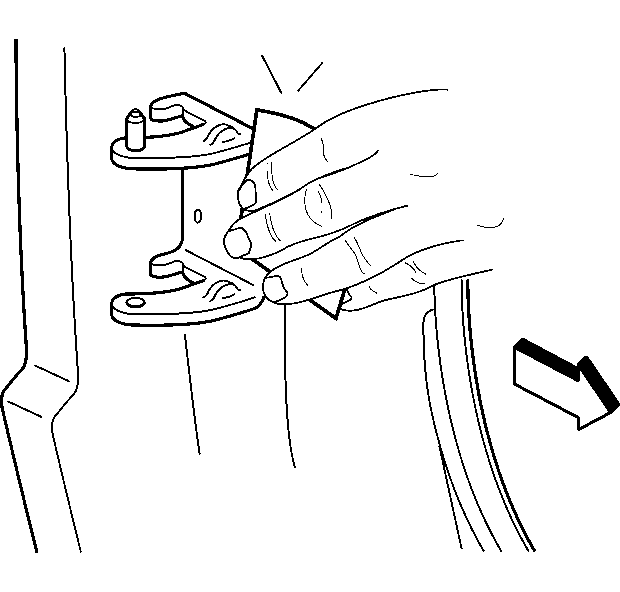
Important: Original punch marks may not necessarily indicate the center of the welds.
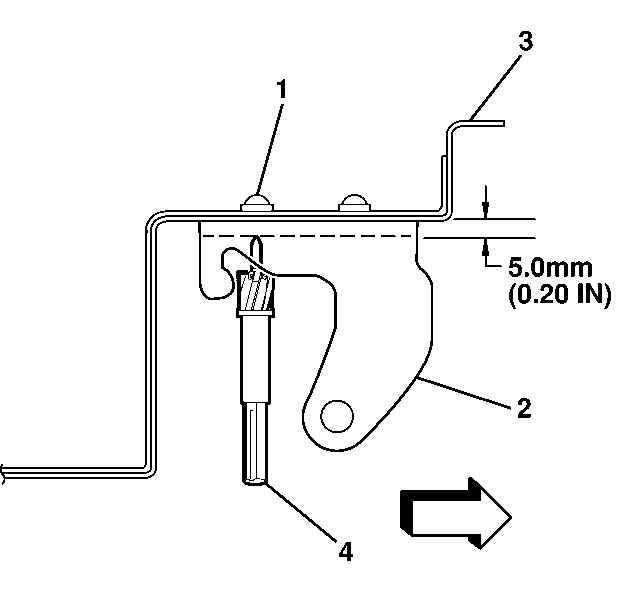
Important: Do not drill into the door frame (3). Drill through hinge only. If necessary, use a chisel to separate the hinge from door.
Installation Procedure
- Repair any damage done to the pillar during drilling or removal.
- Position the hinge within the scribe marks on the hinge pillar.
- Center punch each stud location on the pillar according to the service hinge.
- Drill a 3 mm (1/8 in) pilot hole at each center punch location.
- At the pilot hole location, drill 11.5 mm (29/64 in) hole through the hinge.
- Apply an approved anti-corrosion primer to all bare metal surfaces.
- Feed fish wire GM P/N 15017229 through the hinge, the hinge pillar and out the conduit hole in the pillar.
- Install stud GM P/N 15017230 into the end of the fish wire and pull the stud into position.
- Hold the stud in position with the hinge and remove the fish wire.
- Install nut GM P/N 11516746 on the stud and draw the stud through the pillar. This will seat the stud and prevent it from splitting.
- Repeat steps 7-10 on the remaining stud locations.
- Remove the nuts and hinge.
- Apply a full-bodied caulk to the entire hinge mounting surface to ensure a proper seal.
- Align the hinge and install using fasteners supplied.
- Torque the hinge bolts to 25 N·m (18 ft lb).
- Clean and prepare all surfaces.
- Refinish as necessary.
- Install and align all related panels and components.
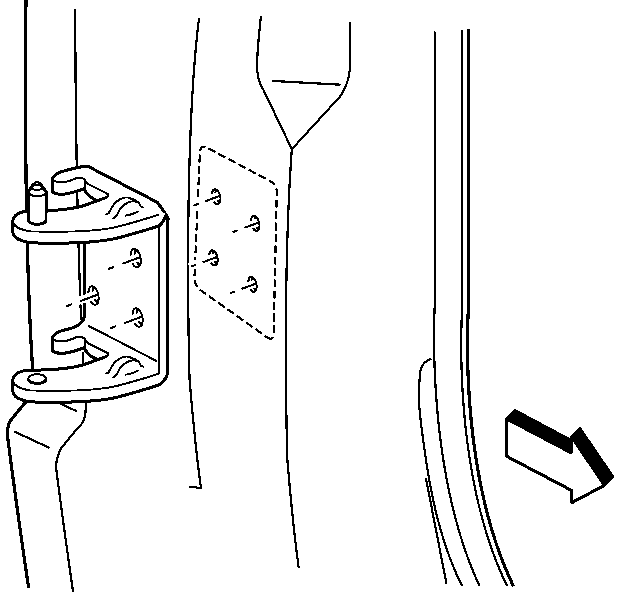
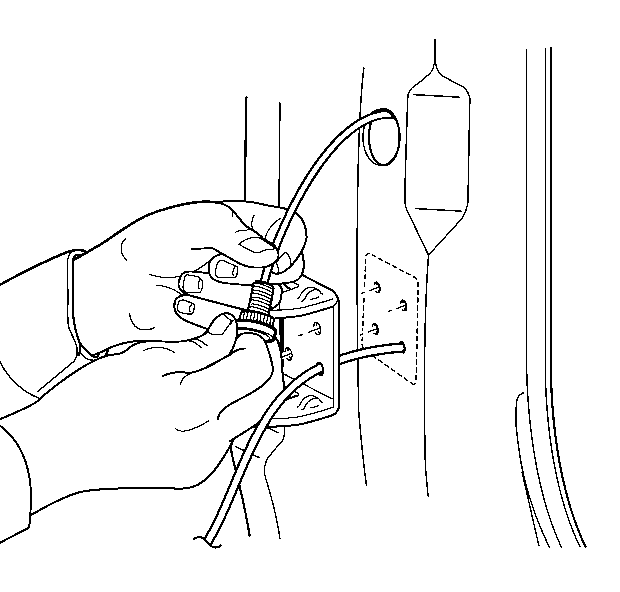
Important: Prior to refinishing, refer to Publication GM 4901M-D-2000 GM Approved Refinish Materials for recommended products. Do not combine paint systems. Refer to paint manufacturer's recommendations.
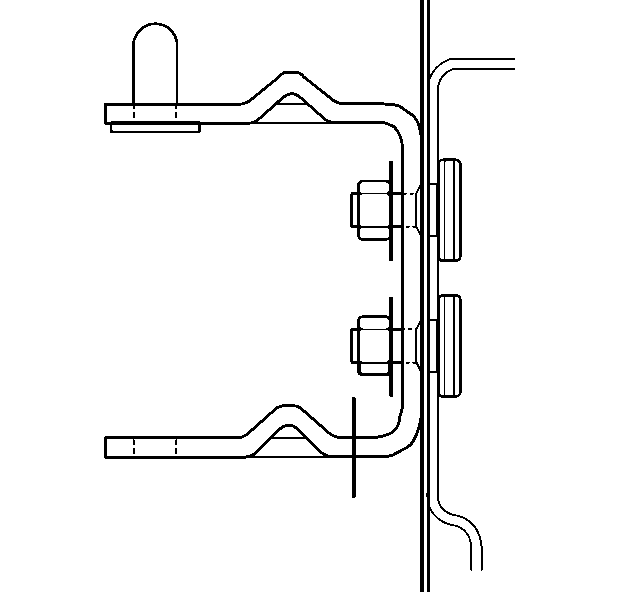
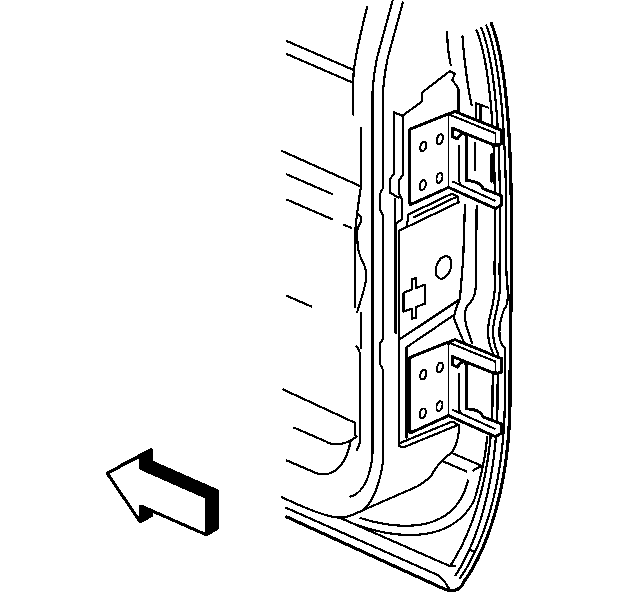
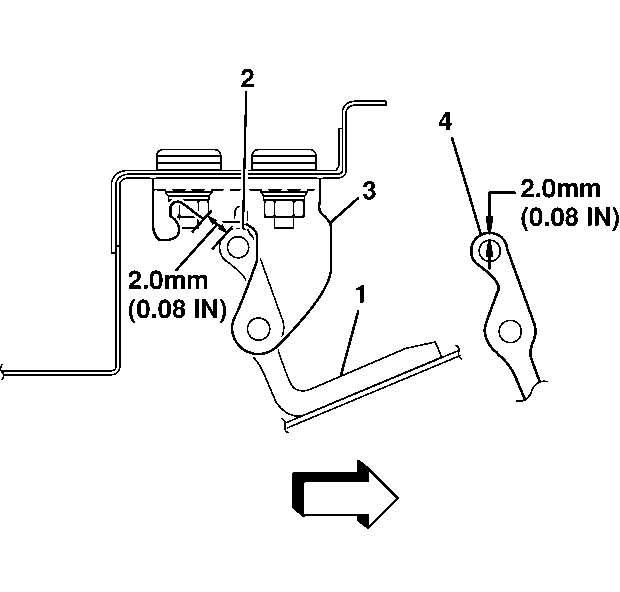
Important: If installing the original access door without a door side service hinge or a used access door, you must modify the door side of the hinge (1) lower extensions (2).
Hinge extensions must maintain a wall thickness of 2 mm between the end of the extensions and the body side hinge nuts (3). Maintain a wall thickness of 2 mm around the hole at the end of the extension (4). Prior to refinishing, refer to publication GM 4901M-D-2000 GM Approved Refinish Materials for recommended products. Do not combine paint systems. Refer to paint manufacturer's recommendations.